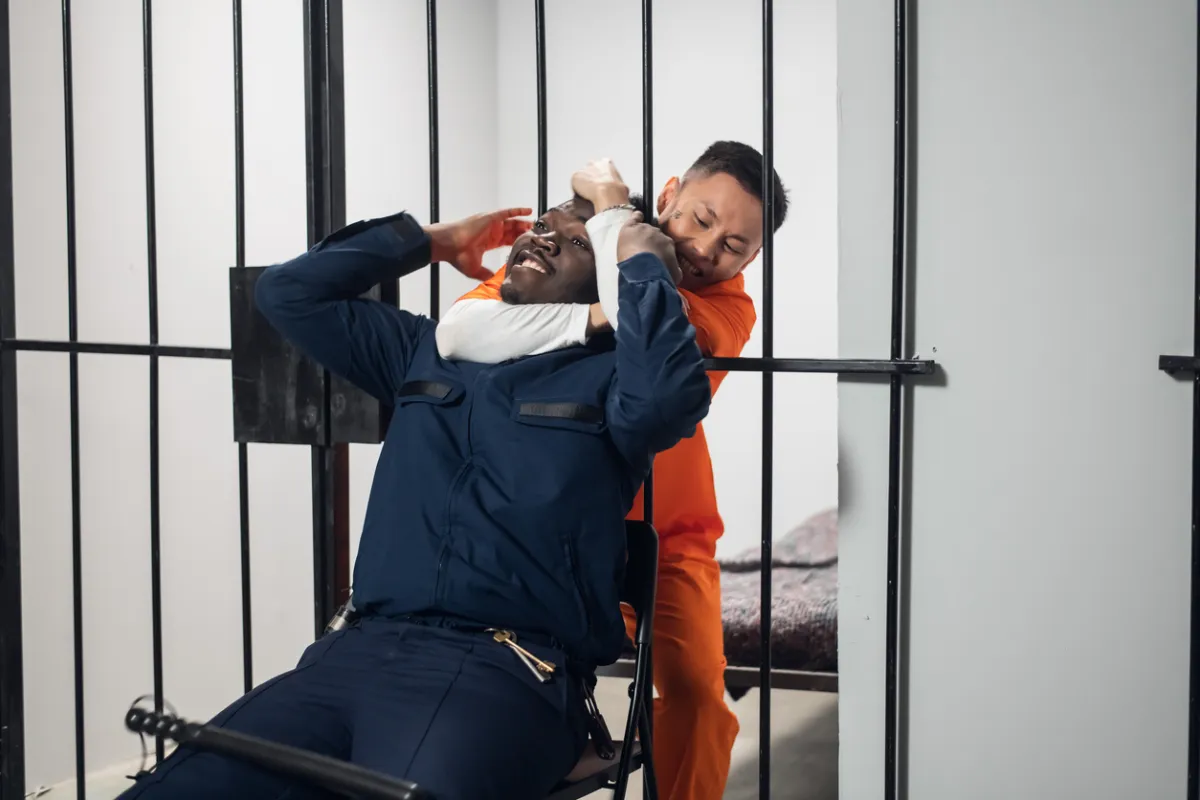When you think of someone charged with assaulting a police officer in Virginia, you likely picture a hardened, violent criminal brandishing a weapon at an officer of the law.
You might believe that those who put officers’ lives in danger by violently resisting arrest should face the full weight of the law. However, your outlook can change when a disagreement or minor confrontation with a police officer ends in assault charges.
You shouldn’t take any assault and battery charge lightly, especially when the alleged victim is a law enforcement officer. Virginia’s assault laws mandate serious punishments and consequences for those convicted of threatening or trying to harm the police.
In this scenario, you need a skilled Fairfax criminal defense attorney to protect your rights and help you avoid the harshest penalties that assaulting a police officer can carry.
Understanding Charges for Assaulting a Police Officer in Virginia
The elements of assaulting a police officer in Virginia are nearly identical to those for simple assault.
To convict you, the prosecution must prove that you intentionally placed another person in reasonable fear that they were about to suffer bodily harm. Prosecutors must also prove that you knew or should have known that the person you assaulted was a law enforcement officer.
You can be convicted of assaulting a police officer regardless of whether they suffered any physical harm. What’s more, prosecutors don’t need to show that you had actual knowledge that the victim was a police officer, only that you should have known they were under the circumstances.
Simple assault is normally a Class 1 misdemeanor offense. However, it becomes a Class 6 felony when committed against a law enforcement officer.
What makes police assault charges more serious is the robust public policy in favor of protecting first responders like police officers while they’re engaged in their duties. The strong penalties are also meant to deter individuals from trying to resist arrest or attacking a police officer making an arrest or performing other official functions.
The Hidden Costs of a Conviction
As the lowest level of felony in Virginia, the initial consequences of a felony assault conviction against a law enforcement officer might not seem too serious.
In general, Class 6 felonies are punishable by a prison sentence between one and five years. That said, courts can also treat them as misdemeanors and sentence the offender to up to one year of imprisonment and up to $2,500 in fines.
But the costs of being convicted of assaulting a law enforcement officer go far beyond a potential fine and incarceration. The following are some of the consequences beyond jail time for assaulting a police officer:
Mandatory Minimum Prison Sentence
Per Virginia’s assault laws, a court must sentence you to a minimum of six months of incarceration for assaulting an officer. This sentence could cause you to lose your job and significantly disrupt your family life.
Felony Criminal Record
Being convicted of assaulting a police officer or other government official creates a felony criminal record that can haunt you for years.
As long as this conviction stays on your record, you may find it difficult to obtain employment or housing. You could also face social stigma from others who might view you as dangerous, disorderly, or disruptive.
Related Charges That Often Accompany Assault Allegations
When a police officer is the victim of a crime such as assault, prosecutors will closely examine the facts of the case to see if they can charge the suspect with any related crimes. Some of these other offenses could include:
- Assault and battery on a law enforcement officer
- Malicious bodily injury to a law enforcement officer
- Using or displaying a firearm while committing a felony
- Aggravated malicious wounding
You could also be charged with resisting arrest, which is a Class 1 misdemeanor. The main difference regarding resisting arrest vs. assault on officers comes down to your intent. Specifically, resisting arrest requires proof that you intended to prevent, delay, or impede a police officer in making a lawful arrest.
Sentencing: What You’re Really Facing
If you’re found guilty of assaulting a police officer, the next stage of your trial is sentencing. During this proceeding, the court will consider your statements as well as the prosecution’s before handing down a sentence. The court will inform you of:
- The length of your prison sentence, including any mandatory minimum term you must serve
- Any probation term the court is sentencing you to and the conditions of such probation
- The amount of any fines or other costs you must pay
- Special conditions you must abide by while on probation, such as having no contact with the officer or their family, or completing compulsory substance abuse treatment
Courts have some discretion in sentencing, and they may use this discretion to punish certain offenders more harshly than others if they have a significant criminal history.
When examining how prior record affects police assault sentencing, someone who has previously committed assault or other crimes against law enforcement officers can expect a sentence that exceeds the mandatory minimum.
The court won’t tell you how much your sentence will affect your family and professional life, but your sentencing date could mark the day that your life changes forever. Even if your sentence is relatively short, it could take years to start rebuilding your life.
How Prosecutors Build Their Case
You might naturally wonder how prosecutors build police assault cases. Unlike simple assault charges, for which victims may be reluctant to testify and eyewitnesses may be unreliable, prosecutors typically have an easier time building a case when a police officer is the alleged victim.
The prosecution might base its entire case against you on two pieces of evidence: the officer’s testimony and their body camera footage.
Despite countless news stories of police misconduct, officers still command a considerable amount of respect in court. They make strong and credible witnesses, and judges and juries are often inclined to believe their testimony and give them the benefit of the doubt.
The longer the officer has been on the force or the more active they are in their community, the stronger a witness they’ll likely make.
If the officer was wearing a body camera, you can expect the footage to feature prominently in the prosecution’s evidence. Even if the footage is incomplete or out of focus, prosecutors can use audio of the officer giving commands or struggling to detain you to imply that you were actively and intentionally resisting arrest or fighting back.
If other officers were present, the prosecution will almost certainly use their statements and body camera footage as well.
And while not legally required, prosecutors may present medical reports or statements from emergency medical services personnel if you injured the alleged victim. They may use this information to argue for a harsher sentence.
Strategies for Pushing Back: Legal Defenses That Work
Self-defense and other defenses available in simple assault and assault and battery cases aren’t available when you’re charged with assaulting a police officer. For example, resisting even an unlawful arrest isn’t a valid defense to charges of assaulting a police officer.
Instead, your criminal defense attorney will explore whether any of the following defenses are available:
Lack of Knowledge
The prosecution must prove that you knew or should have known that the alleged victim was a police officer when you assaulted them. If the officer was in plain clothes, didn’t display a badge, or didn’t identify themselves as a law enforcement officer, prosecutors might not be able to meet this criterion.
Lack of Intent
Similarly, the prosecution must show that you intended to put the victim in fear of physical injury or bodily harm. In the chaos of an arrest where multiple officers are shouting various commands at you, a judge or jury could find that any involuntary or erratic movements you made don’t satisfy this element.
Unreasonable Fear
Finally, the officer must have reasonably feared imminent bodily injury. The court will determine whether this requirement was met by considering what another objective officer in the alleged victim’s position would have believed.
Limited Self-Defense
While you might not be able to assert complete self-defense when a law enforcement officer is arresting you, citizens do retain a limited ability to defend themselves against excessive force by police. This defense suggests that you lacked the requisite criminal intent to commit assault.
The Importance of Acting Fast: Legal Support and Next Steps
Your ability to successfully defend yourself against your charges depends on how quickly you retain qualified legal counsel. The police will likely try to interrogate you shortly after your arrest, and any incriminating statements you make can be used to point to your guilt later on at trial.
You should invoke your constitutional right to an attorney at the first opportunity. From there, you and your lawyer can take the following steps:
Consult a Defense Lawyer
Once you ask for an attorney, you aren’t obligated to answer any further questions about the incident without your lawyer present. The police must also allow you to reach out to an attorney of your choosing.
Your lawyer will come to meet with you, obtain the initial police reports, and advise you on whether and how to answer the police’s questions.
Secure Your Release From Custody
If you’ve been put in jail, your attorney will push for your release from custody pending the resolution of your case.
Judges have discretion to set the conditions of pretrial release they believe are necessary to ensure that the accused won’t commit other crimes while awaiting trial and will appear for all scheduled court hearings. Your attorney can make a persuasive argument that you should be released and not held in custody.
Obtain and Review Evidence
You and your attorney are entitled to receive and review copies of most reports, video footage, and other evidence the prosecution intends to use to prove its case.
As you go through this material with your attorney, the two of you can collaborate on how best to challenge the prosecution’s evidence and identify other facts and materials you can use to support your police assault charge defense in Virginia.
Completing this step quickly yet thoroughly is critical for building the best defense possible. Evidence that could exonerate you can easily be destroyed, corrupted, or lost over time. A lawyer’s early intervention in your case will serve to secure these vital pieces of evidence for future use, even if your case takes months or years to resolve.
Evaluate Plea Agreements and Other Options
You or the prosecution can open plea negotiations at any time and explore other ways to resolve your felony assault charges without a trial. When deciding whether to accept a plea bargain, most prosecutors will consider factors like:
- The strength of the prosecution’s case
- The alleged victim’s wishes
- Your prior criminal history
- The office’s policies and norms
- The office’s demands and resources to handle your case
Your lawyer can help negotiate a favorable resolution to your case by highlighting the weaknesses with the prosecutor’s arguments and articulating the defenses you intend to raise at trial.
The less confident prosecutors are in their case against you, the more likely they’ll be to agree to a plea deal that enables you to avoid some of the more serious penalties for assaulting a police officer.
Entrust Your Legal Defense to a Proven Assault-on-Law-Enforcement Lawyer in Virginia
Being charged with felony assault on a peace officer is a serious matter that you can’t afford to ignore. The penalties can be severe and extend far beyond fines and incarceration.
Successfully defending against police assault accusations starts with retaining a capable defense lawyer who can secure your pretrial release from jail, gather strong evidence, challenge the state’s case, and attempt to reach a fair plea deal.
With years of experience representing clients accused of misdemeanor and felony assault charges in Virginia, attorney Scott C. Nolan knows that the best defense will take into account the facts of your case, your goals, and the available evidence.
Contact our office today to schedule a free case consultation and get the legal support you need.



